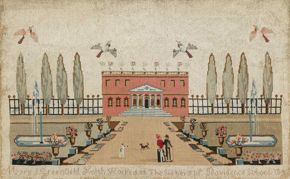Sampling History: A Hidden Chapter Revealed February 16, 2012

Mary J. Greenfield Smith, Woolwork Picture, c. 1843, wool and silk on linen, the Museum of Fine Arts, Houston, the Bayou Bend Collection, Museum purchase funded by Miss Ima Hogg, by exchange, and Bobbie Nau.
Bayou Bend has acquired a rare sampler, skillfully stitched by an African American girl born in 1829. Mary J. Greenfield Smith was a student at the school of the Oblate Sisters of Providence—the first Roman Catholic society for women of African descent in the United States. The Oblate sisters founded a school that embraced a curriculum similar to schools for white girls of the time: preparing students to run their own households, work as servants, or support themselves with sewing skills.
Until recently, collectors and researchers of embroidery focused solely on samplers created by white girls, mainly because more were made and came with better documentation. Only a small number of embroidery pieces created by African Americans are held in museum collections, and these works have just been identified in the past 15 years. Bayou Bend’s new acquisition serves as a window to a seldom-seen segment of U.S. history: when young African American girls struggled to find a place for themselves during the tumultuous pre-Civil-War environment.
The embroidery that Greenfield Smith stitched around the age of 14 depicts a two-story building, urns of flowers, and a pair of fountains. A couple walks hand-in-hand toward the house, and a child plays with a dog.
This charming, park-like setting of daily life was unusual for its time. Michael K. Brown, curator of the Bayou Bend Collection, explains why: “This piece is rather ambitious for its size (15½ x 25 inches) and interesting because of the subject matter. Samplers worked during this period were often religious in nature, or depicted floral compositions and similar subject matter that responded to a Victorian sensibility.”
► Visit Bayou Bend to see the sampler in person, and prepare to be inspired.





